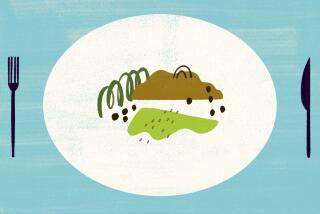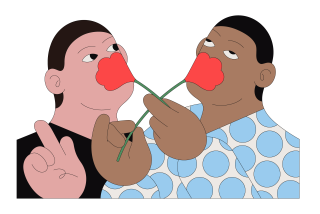Hungering for Taste in a Bland World
- Share via
I teach English to immigrant students and when distinguishing between adjectives and adverbs, I may explain the difference between “I smell bad” and “I smell badly.” However, I will never tell my students that I not only smell badly, but that I smell not at all. They also don’t know that I taste not at all.
At the end of each semester we have a party to which we all bring foods representative of our native countries. My students so want me to enjoy their contributions that I don’t have the heart to tell them that I can only enjoy the texture of their empanadas or shredded jellyfish. And so, for the fifth semester now, I have faked my gustatory pleasures.
Two years will have passed since I lost my senses of smell and taste (which are physiologically related). I’ve heard all the jokes about being a tasteless person and have done my share of dutiful smiling. Now I rage against my bland world and refuse to accept my condition as permanent because of the rare glimmers of taste and smell I inexplicably get from time to time.
My taste disappeared at the height of an extreme allergy attack--but the allergy soon was controlled and still my taste was absent. Subsequent X-rays revealed a long-standing sinus infection, which did not yield to six antibiotics or two kinds of sinus surgery. My medical mystery tour has included further X-rays, a CAT scan, blood tests, cultures and a biopsy. There were ear, nose and throat, neurological and infectious-disease consultations, weekly sinus irrigation, zinc therapy, and presentation of my case to medical committees at USC and UCLA.
And still no diagnosis and no taste.
Oh, there have been moments, even hours at a stretch when, because I suddenly became aware of odors, I realized that I could taste as well. And then it was carpe diem --seizing the moment--to stuff my face with anything within reach. Even the taste of a lettuce leaf brings tears to my eyes. There were mad dashes to favorite restaurants where occasionally and ecstatically, two or three times, I was able to taste the whole meal. But other times, my taste would be gone by the time I reached the restaurant door. Worse still, it sometimes disappeared after the first few bites.
Because my taste buds are unimpaired, I can tell if a food is spicy, sweet, salty or sour. But, because the fumes from the food are not perceived by the olfactory nerves, I can’t distinguish a particular taste. Blindfolded and set before 31 flavors of ice cream, I could tell you I was eating ice cream, but I couldn’t tell which was strawberry or chocolate.
Friends are surprised to hear that I still get hungry. My empty stomach doesn’t know that there are problems upstairs. At first I ate everything I had always enjoyed, hoping that with the next bite I’d be able to taste. But after about a year of disappointment, I decided to eat as simply and cheaply as I can. Once a good cook, a taste-as-you-go cook, I have lost interest. Now insecure about my culinary skills, I rarely entertain. Going out to dinner with friends isn’t the pleasure it once was; travel has lost a dimension.
I am cranky, temperamental and frustrated. My husband, luckily for him, has been able to strike the exact degree of solicitude I need (“What texture do you feel like eating?”), but mostly I want to avoid the subject because I find it so depressing. Then my guilty conscience raises itself and I think how much worse my life could be.
If I knew now that I would never again regain my sense of taste I could come to terms with that fact. But the occasional signs of life in my olfactory nerves are what cause me such intense frustration and yet make me hopeful that one day again I’ll be able to savor lettuce . . . dry toast . . . grapes . . . chocolate . . . dim sum . . . CHEESECAKE.


